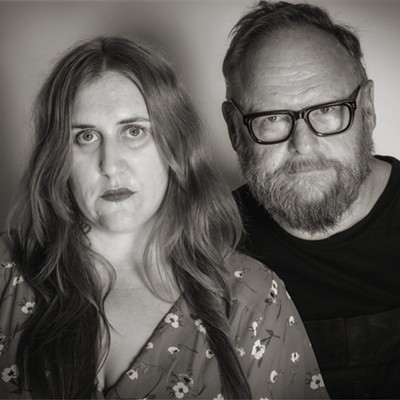On Black Comet, "There are fewer layers that you need to strip away to capture the personalities of the band," explained Nesseth. "The first record that we did was quite produced."
This is a reversal of most bands' recording trajectory: Normally, you hear about the stripped-down 4-track version that was then fleshed out in the studio. The Heavenly States are not most bands.
"I feel like we're the Replacements," said Nesseth. "There's this one record that everyone thinks is their first record, Stink. It's actually not their first record, it's their second record; their first record is called Sorry Ma, Forgot to Take Out the Trash, and it's much more produced ... whereas Stink is this just knock-down drag-out thrash punk record ... . So I think them making the studio record made them not want to make (another studio record). That's kind of what happened with us."
The Heavenly States, as the name suggests, have dreamy songs with "flutes, horns, all sorts of stuff," in addition to the core instruments: guitar, drums, bass and violin. They can go from knock-down drag-out rock to pretty and melodic pop, and they aren't concerned with overproduction on their records or in their live show.
"A lot of people feel the need to re-create (what's on the record). I don't think we really feel that need. We just think our live thing is our live thing and our making records thing is our making records thing," said Nasseth.
As you can see, the band is just, well, cool with everything, in a proactive way. They may have a vision, or a certain expectation or idea in mind, but if it changes along the way, or things don't go as planned ... well, that's fine, too. Like the relaxed air of their music. Like their tour in Libya.
Yes, Libya. American rock music hasn't penetrated the African country since 1963, and so Nesseth, drummer Jeremy Gagon and violinist Genevieve Gagon (Jeremy's sister) decided to try to break the cultural barrier.
"It made perfect sense to try to do it; one, because no one had done it before, and two, this band has always tried to see different ideas through," said Nesseth. "Everybody can say, 'Wouldn't it be cool to do that?' Or, the guy that invented the spatula--there's a million guys who are like, 'I thought of that. I totally thought of that.' Yeah, but you didn't actually put forth the effort to make the spatula, all you did was go, Wouldn't it be great to have something to scoop my fuckin' burger? So ultimately, that means nothing, but actually doing it means a hell of a lot. So we put up a bunch of our own money, and got some money from some groups and put it together and made it happen."
Even though it turned out different than expected--the Libyan government canceled all of the shows once the band got there, and "after a lot of groveling and begging and pleading" they were allowed to play one show in the basement of the British consulate's house--Nesseth said "it was a total financial nightmare, and the most amazing experience we all have ever had.
"There are photos of people literally three feet in the air, leaping, while we're playing a cover of 'Rock the Casbah,'" said Nesseth. "Their comments about the music were so free of musical baggage. Critics and different people that you talk to at your shows are like, 'Oh yeah, this is like a cross between the Fall and early Dino J. and, like, you guys really have a Replacements thing going on.' And (the Libyans) were like, 'Your guitars were making me want to break things,' and, 'Your violins were cutting into my skull.' The things that they were saying were totally based on the experience from the moment, and not on anything else."
The Heavenly States embrace the experience of the moment, especially when it comes to their music, even if there are uncomfortable or less than ideal situations they have to work through. "We're total nerds, we address everybody's issues all the time; it's totally lame to be on tour with us," said Nesseth. "We've had, like, eight or nine different bass players and they come in and they're sort of blown away by the family environment that our band creates naturally. It's sort of ridiculous, but it is what it is, I guess."
The Heavenly States are a well-adjusted family, and it actually makes for non-dysfunctional music that is indeed cool.








